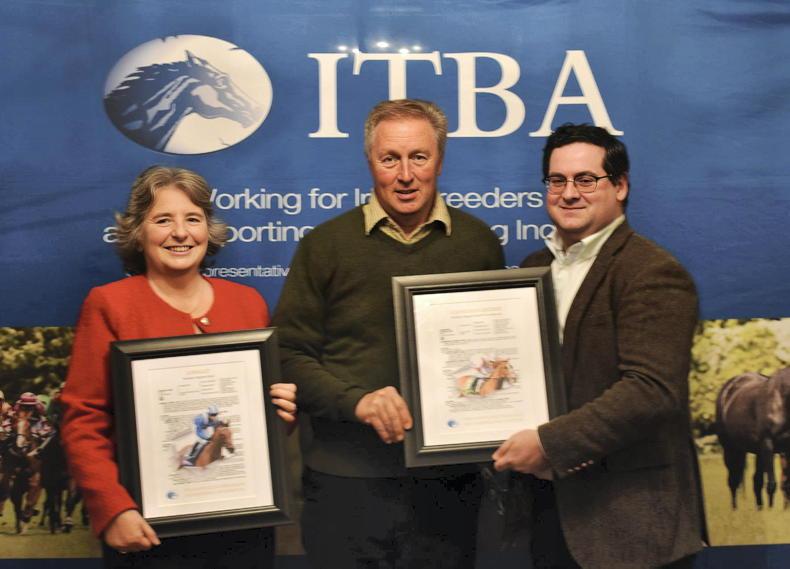IRELAND’S breeding industry received a major boost this week with the news that British breeders are no longer required to pay a deposit equivalent to 20% of a mare’s value when sending a mare to be covered in Ireland.
Known as the Temporary Admission bond, the deposit requirement was imposed on British breeders following Britain’s exit from the European Union. Even though the deposit was returned to the breeder when the mare returned to Britain, the extra paperwork and costs involved had a seriously adverse affect on the number of British mares visiting Irish-based stallions.
Research conducted by the Irish Thoroughbred Breeders’ Association [ITBA] two years ago found that the number of mares arriving from Britain to be covered by top-end stallions fell by 27% in 2021. The situation was expected to worsen in 2022 and was thought to have an even bigger impact on middle-level stallions as the biggest British breeders generally managed to overcome the extra costs involved in getting their mares to elite stallions.
Coolmore Stud had a bond in place which protected its British-based customers to an extent, but all other Irish stallion farms relied on their clients to foot the bill.
Cathy Grassick, ITBA chairman, expressed delight at the news. “We have been lobbying for this change for a long time. On behalf of the ITBA, I am delighted that the many hours of hard work and collaboration by the ITBA and the Department of Agriculture through Minister Charlie McConalogue, Minister Pippa Hackett and Minister Martin Heydon have come to such a positive result.
“We would like to thank the Ministers and their teams for understanding the significance of this issue, in the aftermath of Brexit, and for working for Irish breeders and the thoroughbred industry to rectify this matter. This is an excellent result for the breeders of Ireland which will see many more UK breeders being able to access Irish-based stallions and to board their mares on Irish farms for the breeding season.”
Patrick Keane of Ballinroe Transport added: “It’s great news. It will be a big help to those travelling mares with foals from Britain to Ireland.
“Since Brexit breeders in Britain who wanted to send a mare to Ireland for covering or boarding either had to purchase an ATA Carnet or put a value on the mare, pay the VAT (20%) and claim it back. It often amounted to a lot of money and it was transport firms like ourselves who had to do the paperwork.
“It was a big deterrent for British breeders against using Irish stallions, especially in the National Hunt sphere. I’m sure a lot of Irish studs were down in mare numbers from Britain in recent years.”
Initially the Temporary Import bond also affected British-trained racehorses travelling to compete in Irish races but this requirement was removed relatively quickly. Keane explained: “I’m pretty sure racehorses have been able to come and go [without the deposit being paid] for individual races. It only affected British-owned horses who were being sent into training here.
“Sending racehorses and breeding stock from Ireland to Britain was never a problem. It only affects horses coming from a non-EU country into Ireland.”
Department statement
According to the Department of Agriculture, it is now possible to import a horse into Ireland “for sporting events, breeding, training, grazing or for the performance of work or transport without the requirement for a security deposit on import.”
This waiver of the security deposit for breeding and training only applies to horses classified by the Revenue Commissioners as “pure-bred” horses for customs purposes, which is believed to mean the horses must be registered with a recognised studbook.
Horses participating in sporting events will require proof of the scheduled attendance at a race meeting/sporting event to qualify for temporary admission.
Bloodstock entering for breeding, training, grazing or the performance of work or transport will require an agreement or contract which includes the following details listed: Passport number or identification number of the horse, names and addresses of both parties to the agreement or contract, location of the service, length of time and signatures of both parties.
It is envisaged that most nomination contracts or training agreements can easily be adapted to include this information and can therefore be used to allow temporary admission.
Minister Martin Heydon said: “This is significant and positive news for the equine breeding and training industries. This procedure was already in place for horses travelling to Ireland for racedays and its extension to those travelling for breeding and training is most welcome. It is an issue I have been pursuing for many months and we have finally made the necessary breakthrough.
“Since Brexit, British breeders have been discouraged from sending mares to Ireland due to the time, paperwork, and tie-up of financial resources in security bonds. This led to a drop off in the number of British mares travelling to be covered by Irish stallions.
“I believe the removal of the need for a security bond will help reverse this trend as it brings Ireland into line with the arrangements available for Irish mares travelling to the UK.
“I want to acknowledge the work of the industry and stakeholder bodies such as the Irish Thoroughbred Breeders’ Association (ITBA) in raising this issue and recognise the extensive work carried out by many across Government to get this over the line.”




 This is a subscriber-only article
This is a subscriber-only article
 It looks like you're browsing in private mode
It looks like you're browsing in private mode









SHARING OPTIONS: